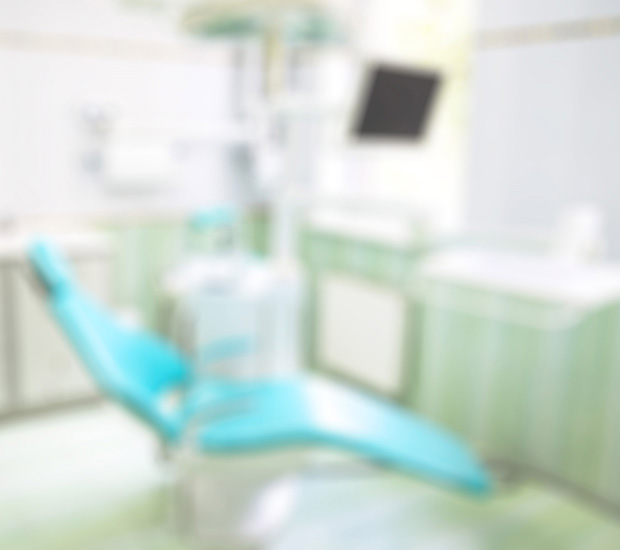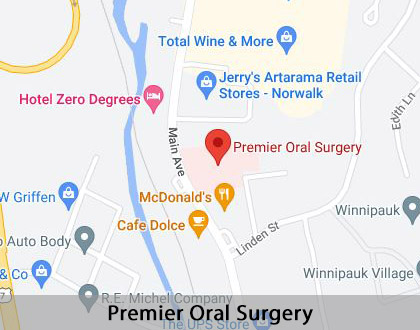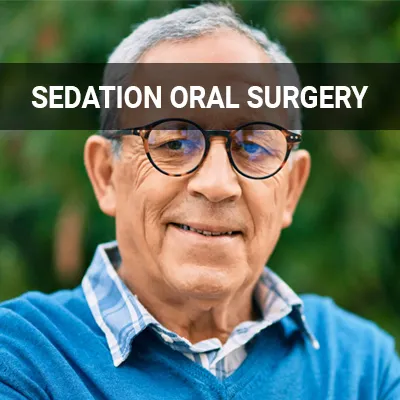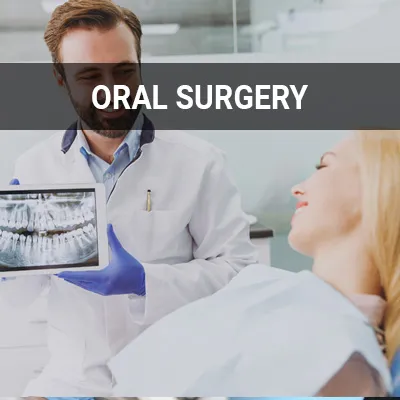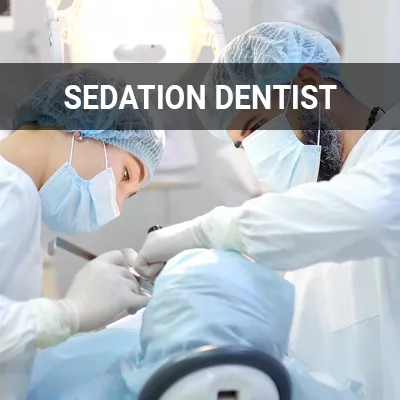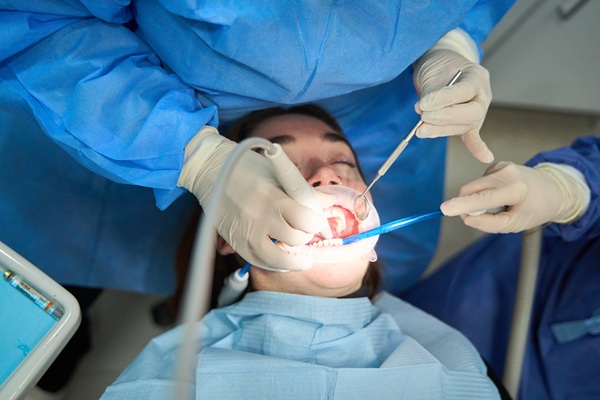General Anesthetic Norwalk, CT
The use of general anesthesia ensures that patients remain relaxed and sometimes unconscious during oral surgery, including oral and maxillofacial surgeries. It eases the stress and anxieties of patients facing complex procedures, while also ensuring they do not feel any sensations during the procedure. Our oral surgeon and team uses general anesthetic to provide safe and effective procedures.
Premier Oral Surgery offers general anesthetic in Norwalk and the surrounding area. Any anxiety about surgery should never prevent you from getting the care you need. Call (203) 945-0049 today for more information or to schedule an appointment.
What is General Anesthetic?
General anesthetic uses a combination of medicines to put the patient into an unconscious state where they are unable to move or feel pain. While under general anesthetic, the patient will be completely unaware of what is happening around them and will have little to no recollection of the procedure when they come out. Patients who receive general anesthetic will commonly hear the phrase "going under." This merely means that they will either be in a relaxed state, or possibly even fall asleep, during a procedure.
This medicine is usually administered through an IV drip in a vein of the patient’s arm or hand. They may also breathe in the sedation through a mask. A general anesthetic is known to stop nerves from delivering signals to the brain and prevents the individual from feeling pain during an oral surgery procedure.
“General anesthetic uses a combination of medicines to put the patient into an unconscious state where they are unable to move or feel pain.”
When General Anesthetic is Necessary
Practitioners may recommend general anesthetic for several reasons ranging from procedure complexity to patient comfort. A general anesthetic is usually recommended if an oral surgery procedure takes a few hours or more. Procedures that affect a person's breathing or involve significant blood loss will typically call for a general anesthetic as well.
In oral surgery, general anesthetic can help facilitate treatment in people with significant anxiety or patients with challenging behavior, such as children and those with special needs. A general anesthetic is also relied upon for those undergoing complex or multiple maxillofacial procedures. Ultimately, our oral surgeon will work with the patient and review their needs to determine if general anesthetic is necessary for their treatment.
“If an oral surgery procedure takes a few hours or more, a general anesthetic is usually recommended.”
Risks and Side Effects
For the most part, side effects are minor and do not tend to last long after the general anesthetic wears off. In addition, not everyone will experience them, and some people will experience none at all. Typical side effects include:
- Bruising or soreness (if IV is used)
- Cold feet or shivering
- Confusion and memory loss
- Dizziness
- Nausea and vomiting
- Problems passing urine
- Sore throat
Not all of these side effects are a result of the medication itself. Also, some are more common in individuals of certain ages or with certain medical conditions. Our team will discuss side effects with each patient and offer advice on reducing and managing them.
While there are risks associated with general anesthetic, any major complications are highly unlikely, and our oral surgeon will take the necessary steps to ensure the patient’s safety. Those who smoke, are overweight, heavy alcohol users, or have certain medical conditions are at higher risk.
“While there are risks associated with general anesthetic, any major complications are highly unlikely, and our team will take the necessary steps to ensure the patient’s safety.”
Check out what others are saying about our dental services on Yelp: General Anesthetic in Norwalk, CT
How to Prepare
In order to avoid or minimize the risk of complications and determine the correct type and level of medication to use, the patient receives a thorough medical exam. Here is where our oral surgeon and team checks for any other factors that increase a patient's risk of complications. Patients need to make our team aware of any medical conditions, implants, medical appliances, allergies, and medications they are taking.
Each patient will receive detailed instructions on preparing to go under a general anesthetic. By relaxing digestive muscles, this medication allows food from the stomach to enter the lungs. We tell patients not to eat and drink anything but water starting eight hours before the surgery. In addition, patients should show up for surgery wearing no makeup or jewelry.
“Each patient will receive detailed instructions on preparing to go under a general anesthetic.”
Questions Answered on This Page
Q. What is general anesthetic?
Q. Is general anesthesia necessary in certain cases?
Q. Are there risks and side effects from general anesthetic?
Q. How do I prepare to be given general anesthetic?
Q. What can I expect to feel during and after the oral surgery procedure?
People Also Ask
Q. What types of dental sedation are available in a dental office?
Q. What is sedation oral surgery?
Q. Why do patients need oral surgery?
Q. What do oral surgeons and dentists have in common?
Q. What are a patient’s options for replacing multiple teeth?
What to Expect
The general anesthetic will be administered before the procedure, either through an IV or inhaled through a face mask. The patient should fall asleep very quickly. A tube may be placed in the patient's throat to aid in breathing. Our oral surgeon and team will carefully monitor vital signs throughout the entire process.
Once the procedure is over, our oral surgeon will continue to monitor the patient as they return to consciousness. The patient may feel groggy and have some discomfort from the procedure as the medication wears off. However, our team will make every effort to make sure the patient remains comfortable. In many cases, the patient will want to arrange a ride home after the procedure. During a consultation appointment, the oral surgeon will go over all necessary steps the patient needs to take after the procedure.
“Our team will carefully monitor vital signs throughout the entire process.”
Frequently Asked Questions about General Anesthetic
Q. Can I take my regular medications before general anesthetic?
A. The oral surgeon may have you take your regular medication before with only a small sip of water. However, it is usually better not to take anything eight hours before surgery. We will discuss this with you at length during the pre-surgery appointment.
Q. What drugs and supplements do I need to avoid?
A. There are certain medications and supplements you may need to stop taking a week or more before your procedure. These include drugs and supplements that increase bleeding, such as aspirin, blood thinners, St. John's wort, and ginkgo biloba. We will discuss further details with you when we take your health history.
Q. How long will it take for the general anesthetic to wear off?
A. The answer to this is slightly different for everyone. For the most part, people are groggy but awake when first coming out of general anesthesia. Most people do not feel any effects after 24 hours. However, it can take the body up to a week to eliminate the medication completely.
Q. What should I do during the initial recovery period?
A. People should avoid driving the first 24 hours after coming out of a general anesthetic. We typically suggest people have someone with them during this initial period, as you may feel sleepy, have slow reflexes, and have impaired judgment. Patients should stick to clear liquids and soft foods for the first 24 hours.
Q. What should I avoid right after coming out of a general anesthetic?
A. We will give you detailed aftercare instructions to follow at home. Besides driving or operating heavy machinery, you should avoid strenuous activity. Patents are also advised to avoid alcohol and not to smoke.
Start Feeling Better – Visit Us Today
By visiting us as soon as possible, our team can help get you the professional treatment you need. Instead of waiting around and allowing the symptoms to get worse, we can provide you with treatment options.
Call Us Today
The Premier Oral Surgery team offers general anesthetic for surgical procedures. Our oral surgeon proudly serves the community of Norwalk and the surrounding area. Call 203-945-0049 to schedule an appointment or learn more about general anesthetic during oral surgery procedures.
Helpful Related Links
- American Dental Association (ADA). Glossary of Dental Clinical Terms. 2023
- American Academy of Cosmetic Dentistry® (AACD). Home Page. 2023
- American Academy of Maxillofacial Prosthetics. American Academy of Maxillofacial Prosthetics. 2023
- American Association of Oral and Maxillofacial Surgeons. American Association of Oral and Maxillofacial Surgeons. 2023
- American College of Oral and Maxillofacial Surgery. American College of Oral and Maxillofacial Surgery. 2023
- National Cancer Institute (NCI). National Cancer Institute (NCI). 2023
- WebMD. WebMD’s Oral Care Guide. 2023
About our business and website security
- Premier Oral Surgery was established in 2017.
- We accept the following payment methods: American Express, Cash, Discover, MasterCard, and Visa
- We serve patients from the following counties: Fairfield County
- We serve patients from the following cities: Norwalk, Cranbury, Spring Hill, New Canaan, Westport, West Norwalk, East Norwalk, South Norwalk, Wilton, Westport, Weston, New Canaan, Tokeneke, Rowayton, Darien, and Noroton
- Norton Safe Web. View Details
- Trend Micro Site Safety Center. View Details
Back to top of General Anesthetic
